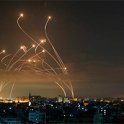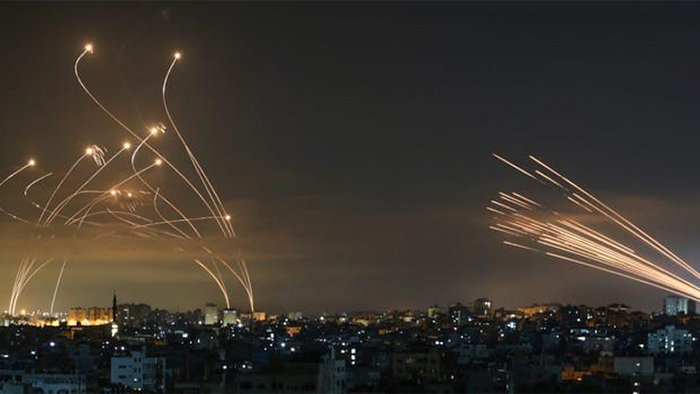Global Risk Perspectives - Monthly insights on geopolitics, trade & climate
Back to articlesBernardo Pires de Lima 

18.06.2021
Entanglements in the Middle East
Some days help us realize how many sides are in play on the field of international politics. A few years ago in Jerusalem I met someone whose courage changed their life and their example serves as a metaphor to approach pain points in the region. "L” had served as commanding officer in an elite squad of the Israeli army, and sustained severe injury in the course of an anti-terrorist mission. He was in his early twenties. The shooter was not a terrorist with Hamas or Hezbollah, but one of his squad mates who, in the dark of night, mistook him for a target. L became a paraplegic, but that did not stop him. I know there are examples of overcoming your limitations all across the world, but the point is, L would later join the national wheelchair basketball team, and he thought the best way to illustrate the complexities of the Middle East and the relationship between Israel and Palestine would be to invite me to sit down and play with him. So I did. My perspective changed. Fears arose, then annoyances and frustration, and then the need to understand your opponent, what moves them, why we're there and who's put us on the spot. A two-sided basketball game with arguments, motivations and weapons on either side.
When I bring up a story like this I don't intend to boil down conflicts in the Middle East to a game of basketball. Usually I’m inflexible when it comes to metaphorical associations between sports and wars. And that's not the point. It's about the need to walk in somebody else's shoes to realize what's at stake. It's not about patronizing or exculpating anyone, just being willing to break with our absolute truths to find better angles for analysis. Good analysis improves decisions.
We can define Israel and the Middle East through four magic words: territory, identity, religion and resources. It’s in the permanent tension and boundary-blurring among these that conflict arises to a greater or lesser degree. On the same trip where I met L, I had lunch in the home of a Druze family at Daliyat el-Carmel, north of Haifa, and we discussed how those four factors align hierarchically. The Druze are an Arab minority integrated in Israel with sizable population numbers in Lebanon and Syria. They act discreetly in public, steering away from conflict, and keep their religious demonstrations simple. Likewise they cultivate loyalty to the nation-states that welcome them and, in Israel, you’ll find them in the armed forces, the police, or serving in diplomatic careers. In the hierarchy of factors, identity comes first and rounds out their affiliation.
Israel being a multi-ethnic, democratic state, founded on Jewish identity, the major problem isn't Palestine, Hamas, or Iran's nuclear plans. The greatest challenge, which one might say translates to the whole region, lies in the minimally harmonious way that political power can integrate all those identities and make them fit a puzzle where each piece exalts its religious character and indisputable historical legitimacy. To understand this complexity, we’d do best to avoid a Western, single-color lens.

Over the past years, laws approved by Netanyahu on nationality and Israel's exclusive identification as a Jewish state have revealed the fear that identitarian collision between Arabs and Jews may one day change Israel's internal equation by dint of demographics. But it's also become clear how a fragmented partisan system mainstreamed ideological extremes and conditioned moderate decisions. So Israel, over the past two years, has had four legislative elections, a reflection of the political standstill it has plunged into and now further tribalises discourse.
Partly, the political morass in Israel and another delayed election in Palestine explain the recent return to belligerence between Tel Aviv and Gaza. Even if this knot is untied via due process, there's no promise conflicts will not return. Because it will, be it to thrust the double Palestinian question (Gaza and West Bank) onto the media or to foment cohesion in a fragmented Israeli society. To avoid this recurring script, Israel must either force Hamas to demilitarize in Gaza, or diplomacy, in one extraordinary stroke, will lead to a viable two-state solution. Neither seems viable in the short term. Disarming Gaza would mean massive and prolonged occupation by Israel with regional or international blessings, which is out of reach today and entail major military, civilian and political risk. The Islamist volcano simmering around Israel would also discourage such an undertaking.
To demilitarize Gaza and ensure that such an intervention would not be the penultimate one, it would be necessary to undertake intense diplomatic efforts to make the most of the convergence of the regional anti-Hamas front (Egypt, Jordan, Saudi Arabia), the USA, the EU and the United Nations. Would it suffice that Israel counted on good relations with Russia and China to push through the Security Council some form of "peacekeeping” in Gaza with enough funding and means to hollow out Hamas’s Izz ad-Din al-Qassam brigades, the Islamic Jihad, and rebuild Gaza? Maybe. In theory. The problem is Russia’s spreading itself thin across Syria and Ukraine, so it would behove Moscow to hold back on new engagements, even if they are of a political nature, and China is engrossed in regional security concerns. Other than that, you can't rework Hamas without Iran's influence, which would mean an acceleration of dialog now that the wasted Trump years are behind us. None of this is even remotely underway, so we can barely see a light at the end of the tunnel.
One might always believe that elections on Palestinian soil would lead to a more acceptable solution where the Palestinian Authority won in Gaza and the West Bank, undergirded with sufficient, long-lasting funds to pay wages, run schools, hospitals, and police, taking away political ammunition from groups that have only harmed Gaza and the region. To that end, Israel needs to cede ground in the West Bank. Though looking at Israel's appetite for settlement building, I fear none of the above is on the table.
Disclaimer: Bernardo Pires de Lima, research fellow with the Portuguese Institute of International Relations (Instituto Português de Relações Internacionais) at Nova University of Lisbon.
The views, thoughts and opinions expressed herein belong solely to the author and do not reflect the official positions or policies of, or obligate, any institution, organization or committee he may be affiliated with.
Bernardo Pires de Lima is Political Adviser to the President of the Portuguese Republic. He is also a Research Fellow at the Portuguese Institute of International Relations, IPRI-NOVA, an international politics analyst for the national Portuguese television channel RTP, for radio station Antena 1 and the Portuguese daily Diário de Notícias. He chairs the Luso-American Development Foundation’s (FLAD) Curators Council and has been a Research Fellow at the Johns Hopkins Center for Transatlantic Relations in Washington DC and at the National Defense Institute in Lisbon, Portugal. He has penned eight books on contemporary international politics, the most recent being Portugal na Era dos Homens Fortes: Democracia e Autoritarismo em Tempos de Covid (Portugal in a time of strongmen: Democracy and authoritarianism in a time of Covid), published by Tinta-da- China in September 2020.



